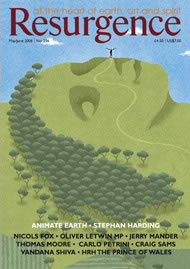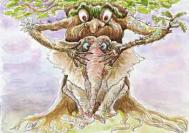TREES AND SHRUBS are to be removed from a road in south London after a robber hid in them to surprise his victim …” Worrying developments hereabouts. Following the decision cited, shrubberies have gone on the offensive. The other night, in an unprovoked attack, a passer-by was seized by a Crataegus monogyna, and forced to hand over his wallet and mobile phone at prickle point. The Crataegus, known to police as ‘Big Haw‘ – a reference to its profuse autumnal berrying – then shuffled off at speed into a nearby alley, its well-developed root structure apparently not hindering its egress.
Last week, meanwhile, an Ulmus procera grabbed an elderly lady as she was walking along the pavement and lifted her high into the air, demanding the passbook to her life savings as the price for setting her down on the ground again. The Ulmus, apprehended by an arboricultural snatch squad as it lumbered away across a local park, later claimed it was afflicted by isolation as a result of the loss of its friends through Dutch elm disease, describing its actions as a “cry for help” and an implicit condemnation of the “rootlessness” of urban society.
The incidents form part of a pattern that has been concerning police and local authorities for some time. Various common evergreens, amongst them Berberis delinquens, Mahonia criminalis and Cotoneaster asboniensis, have been seen “lurking” on street corners and along the sides of roads, often in groups, where they are said to look “shady” or “shadowy”. When challenged, their only excuse has been that they were planted there and have since had no alternative but to grow. “It’s what we do,” said one.
A number of deciduous bushes, including the notorious “shrubber” Corylus avellana, also known as ‘Hazel’, have been caught leaning over the pavement and “happy-slapping” pedestrians as they pass. A ragtag bunch of brambles and nettles, aided and abetted by one or two sycamores, are meanwhile reported to have snatched shears and clippers away from park maintenance staff before trying to find some undergrowth to disappear into. “They were nothing but a gang of low-lifes,” said a shaken worker afterwards.
BUT THE REAL problem is thought to be the Mr Bigs, among them Quercus albaniensis, Fraxinus romaniensis and Fagus afro-caribbiensis, who have been observed frightening people in open daylight by waving their arms about in what is described by community safety officials as an “unruly and wholly uncontrolled manner”. These arboreal bruisers have also taken, each year, to the deliberate desecration of public open spaces with so-called leaf litter. Said a community safety spokesman: “They call themselves trees and blame what they describe as ‘The Wind’ but they haven’t produced a shred of evidence to back this up and frankly it seems a bit nebulous to me.” Requests by the Sanitised Housing In Towns (acronym withheld) initiative for clues that may help in the apprehension of The Wind have so far drawn a blank.
Fortunately, the authorities are on to it. At a packed meeting of the local Public Safety and Community Hygiene forum, officials from the Government’s Cleaner, Safer, Duller initiative promised an unrelenting war against the miscreants. “We will hit them with everything we have got, from chainsaws and glyphosate to asbos,” said a spokesman. “The behaviour of these plants is an insult to the whole concept of safe streets. Before we know it, they’ll be blaming humans for the crimes they’re committing. We have to clear the streets of vegetation and restore crime to its rightful place – in the, er, home. Then people will know who’s beating them up.”
Outside the meeting, a small demonstration was mounted by a group of banner-waving pyracanthas, junipers and sea buckthorns from a group styling itself the Inter-Habitat Alliance of Broadleaves and Conifers against Arbitrary and Ill-Informed Defoliation, Speciesism and Unliveable Cities (ITSABUMMER). A spokesbush said plants were being blamed for crimes committed by humans, adding: “It’s not our fault if street robbers use us to hide behind.” The bush, suspected of being a Pyracantha anonymus hoodii, also criticised the meeting for excluding a large number of stakeholders, who were, it claimed, “unable to come because they are currently tied to stakes.” Asked why its organisation’s acronym bore no relation to the name, the bush said most plants did not have the benefit of a City Academy education, but added: “At least we know we’re stupid, which is more than can be said for you lot.”







